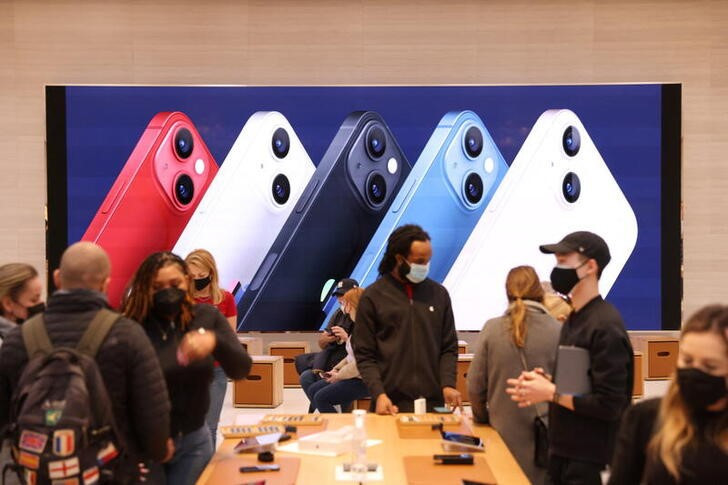Apple's antitrust lawsuit could change the iPhone user experience
(Baonghean.vn) - The lawsuit related to Apple's monopoly is still ongoing and it is unclear what the final outcome will be. However, this lawsuit could lead to significant changes to the iPhone user experience in the future.
When Apple introduced the first Mac computer to the public in 1984, the iconic "Hello" greeting made a lasting impression on customers the first time they booted up the device.
That consumer-friendly motto persists to this day, with Apple carefully crafting an easy yet controlled user experience across its products, including the billions of iPhones in use around the world.

But the Biden administration believes Apple has gone too far. The U.S. Department of Justice (DOJ) recently sued Apple for illegally monopolizing the smartphone market. In a press conference, the government provided a long list of ways Apple allegedly suppresses competitors with its restrictive app store terms, high fees, and “closed” approach that limits how third-party companies interact with Apple’s brands and services.
However, Apple has denied the lawsuit’s allegations and said it plans to fight them, adding that the lawsuit could empower the government to “overreach into the design of technology for everyone.”
But if successful, the lawsuit could impact Apple’s products and services. While the case could take years to resolve, here’s a closer look at what it could mean for iPhone users.
Changes in the App Store
If found guilty, Apple could be forced to make some changes. One of those changes is how iPhone users can gain more access to previously largely restricted “super apps.” The term refers to apps that allow messaging, food ordering, payment processing, and other functions all within the same platform.
According to Mr. Dipanjan Chatterjee, principal analyst at market research firm Forrester (USA), super apps significantly threaten Apple's superior ability in customer service.
“A service like WeChat, dubbed China’s super app, could provide an alternative to the Apple ecosystem that includes chatting, banking, sharing memories, working with partners and more. Apple’s biggest fear is that its devices will no longer be relevant to its customers,” said Dipanjan Chatterjee.
At the same time, super apps like WeChat were created by large companies, which can put some smaller companies at a disadvantage. Perhaps that's why the concept is not well received in the US.
However, the US government could argue that the lack of interest in third-party apps is due to the smartphone market being too large and the company's opposition to offering super apps in the App Store, analyst Chatterjee predicted.
Better Interoperability
Apple may also be asked to provide more support for cross-platform messaging, an issue the company has previously said it is working to address.
The company allows iPhone users to send high-quality photos and videos to each other, but the same messages are slower and pixelated to Android phones. Apple also maintains green “bubble” dialog boxes instead of blue ones, creating a class divide when texting to iOS and Android devices, experts say.
Last November, tech giant Apple said it would add new features such as read receipts, typing notifications, better support for group chats, and higher-quality photo and video sharing across platforms to help bridge the gap.
Apple's move is aimed at promoting the Rich Communication Services (RCS) standard, which is expected to roll out later this year. RCS is seen as a perfect replacement for short message service (SMS), which works over both Wi-Fi and cellular data.
The change comes after pressure from both regulators and competitors to work more seamlessly across operating systems. The European Union’s Digital Markets Act requires companies to make their core services interoperable across platforms. And the US government could require the same.
Support more open services
Another change is that Apple will try to expand the compatibility of more devices and software, such as smartwatches that will interact with Apple's family of devices and software, including the iPhone and Apple services like the online fitness subscription service Fitness+. Previously, Apple also required Apple Watch users to own an iOS device as a way to keep customers in the Apple ecosystem.
Mr Chatterjee said that implementing this change would have both positive and negative aspects.
“The end result is more affordable options for consumers, but also reduces the seamless customer experience that Apple has always valued highly,” he said.
The Biden administration has also been vocal about Apple’s lack of support for mobile cloud services. The decision to expand connectivity could allow users to access games and other cloud-based apps without having to pay for expensive hardware.
Behind the US Justice Department's lawsuit
The Justice Department’s lawsuit alleges that Apple’s behavior violates unfair competition, locking customers into Apple products and preventing other companies from innovating. While the Biden administration will have to prove damages, some analysts say any potential changes Apple might make would negatively impact the user experience.
The market for content and apps should be open, and Apple needs to avoid monopolistic advantages that could limit competition, drive up prices or stifle innovation, said David McQueen, research director at global market research firm ABI Research. But Apple’s success is partly due to its tight control over its products and services, making everything intuitive and seamless.
However, Mr. McQueen also said: “If Apple is forced to comply with the new restrictions, it is likely that the user experience will no longer be seamless. Customers will have more choices with applications and services.”
Chatterjee noted that some users are drawn to Apple’s product line because of its tightly managed ecosystem and ease of use. Apple may have to work harder to maintain the integrity of the user experience. Most Apple customers would be happy with lower-priced options as long as they don’t compromise their experience.
However, he added that those currently outside the Apple ecosystem would likely benefit by “entering the ecosystem without having to fully partner with Apple.”
